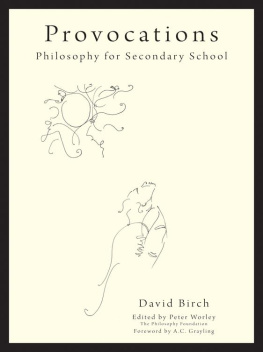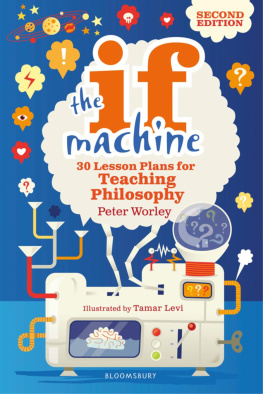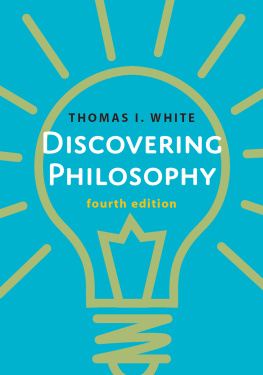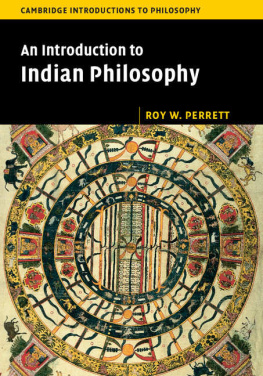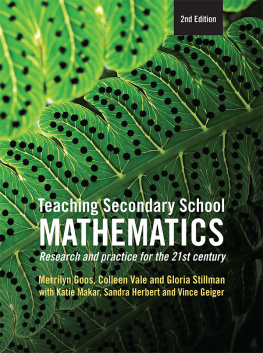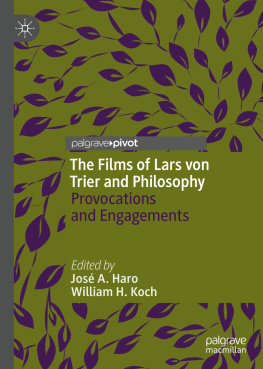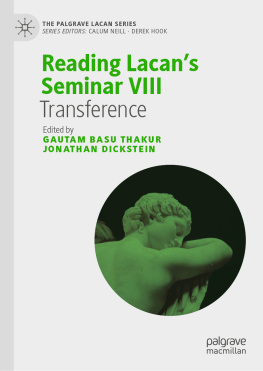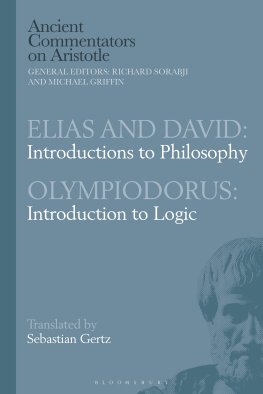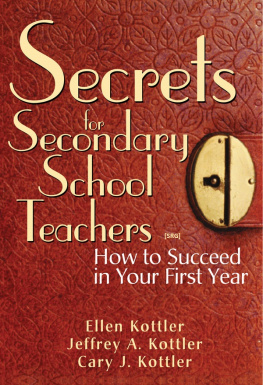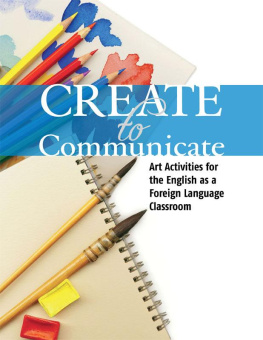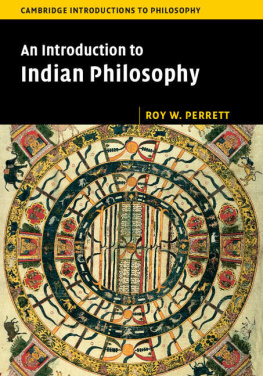I would like to thank Peter Worley, not only for starting the The Philosophy Foundation, but also for his continuing openness and desire to experiment. I am very grateful to Emma Worley for doing such a wonderful job of keeping the show on the road and making it all possible. Thank you to Caroline Lenton for the time and belief she has invested in this growing series of books, and thank you to Tamar Levi for beautifying the book with her illustrations.
Simply by talking about what they think, my pupils at Evelyn Grace Academy in Brixton have helped me to write this book and I am thankful to them. Thank you also to Olivia, Richa and Bhavesh for our weekly conversations. And thank you to Sarah for her encouragement and her loveliness.
In philosophy, as David Birch aptly states in his introduction to this book, no one is an expert and no one is smarter than anyone else. Philosophy is conversation, exploration, experiment (with ideas) and, in general, an effort to achieve greater understanding of whatever topic is under discussion. Everyone has a right to express a view, and the only rules are: do ones best to think clearly and honestly, listen to other points of view and bravely follow where the best arguments lead.
The exercises in this book again with great aptness called provocations by their author are designed to invite reflection and generate debate. They do both these things wonderfully well. The principles that lie behind them, set out by David Birch in his preface and introduction, are excellent. He notes that teaching should not be about handing down knowledge from on high, as a professional such as a lawyer or doctor might do for a client or patient, but instead should be a response to the students curiosity, interest and desire to learn and should provoke these things by being inspirational and by listening; especially by listening to students as they work out their own answers to the questions prompted in them by the world around them and their experience of it.
It is a common view, and one much acted on, that education consists in the transfer of knowledge and skills from teachers to pupils. This is indeed the case for at least part of what is involved in schooling, given that basic information and ways of handling it have to be imparted before students can become more independent as thinkers. But it is also important that students should understand how partial, incomplete and open-ended almost all enquiry is; and that in many areas of enquiry, there are no right and wrong answers, only better and worse reasons for taking this view or that, subject always to scrutiny and challenge.
Philosophy is par excellence the enterprise of being open and exploratory, of accepting that certainties are hard to come by and that complexities often remain after much debate. It also parexcellence teaches the important lesson that this openness, uncertainty and incompleteness can nevertheless be highly productive, for as Paul Valery says, a difficulty is a light; an insurmountable difficulty is the sun.
This book is a superb provocation to philosophy itself. The exercises challenge us to do philosophy, to think philosophically, to generate and test ideas, to try to make sense of what is at stake and to gain deeper insights. It should be in every schoolroom, and every teachers hands, as an instrument that will transform students interest and capacity across the whole range not just of their studies but their lives.
A. C. Grayling
During teacher training I was told by the director of the course that the relationship between a teacher and their pupil should be like that of a lawyer and their client. The idea, generously read it is hard to shake off just how mad and dystopian it sounds seems to be that teachers are experts and teaching is a profession, an idea which I think gets it exactly wrong, more or less. Expertise demands recognition and deference , yet adolescents are the least likely of all people to offer either. A professional teacher is a naked emperor to an incredulous audience. It is impossible to maintain the poise of expertise while spending your day with people who could care less. Composure quickly ebbs away.
The expert is the one in the white coat, unstained and uninvolved. They are never in the thick of it, never in a muddle. I doubt the course director could so easily have spoken of the relationship between a primary school or nursery teacher and a child as being like that of a lawyer and client, which makes one wonder what it is about adolescence that requires this redefinition of status. What compels us to play these parts, when teachers call for order by telling their class to act like professionals ? We feel it necessary to assign adolescents roles, but they are provocatively ill-defined; the thing we least want them to be is themselves (which, of course, is often the thing they least want to be; we become complicit in their self-evasion; there is perhaps something worryingly contagious about adolescence).
An expert is a coincidence of fear and need. Teachers should not think of themselves as needed (nor should they need themselves to be feared). You can only counteract the evidence to the contrary by telling yourself that you are doing what is best for your pupils, whether they know it or not. But its very difficult to talk about knowing whats best for someone without implying that you know whats worst about them. Its very difficult to say, This is for your own good, without sounding like a sadist. Necessity and punishment are cut from the same cloth.
What would education be like if we dropped the idea that it was necessary, if we didnt think of it as something we had to get right, if we werent so worried about getting it wrong? What would we do with it if we didnt think there was any way it should be, if we thought of it as spare time?
We think of lawyers or doctors as experts because they more or less have control over their respective remits. The doctor pretty much knows the effects of administering a particular treatment; the lawyer can pretty much tell the best line of defence and the odds of success.
What is it teachers are thought to have control over? The idea, apparently, is that teachers are experts of impartation they know how to give skills and knowledge. In other words, a teacher can control the outcomes of their teaching. So whereas the lawyer has a level of control over a bureaucratic system of justice and a doctor has a level of control over the body, the teacher has a level of control over the minds of adolescents. This, of course, just sounds silly. What we all know, but rarely acknowledge, is that you cannot teach a pupil something they dont want to learn; the managerial need for evidence is the denial of this.
Learning is a matter of desire, not a question of cognition; of magnetism rather than machinery. How would teaching change if we worked on the basis that we didnt know what we were doing, if we worked not for targets but curiosity, if we thought of the classroom not as a proto-office but as the bit outside the office, the so-called real world? I suggest it may be something like philosophy.
There is nothing essentially good about doing philosophy in schools pupils may just as well learn to surf or garden just as there is nothing essential to, say, English or chemistry. I do not teach philosophy to impart skills, nor do I read it to acquire them (Id rather talk of developing affinities, not abilities). I dont teach philosophy for knowledge as there is none (Id rather give provocation than information). Without knowledge or skills what remains are the pupils themselves. The approach to education advocated in this book is one not based on teaching but listening; listening neither to console nor redeem but to crack things wide open.

